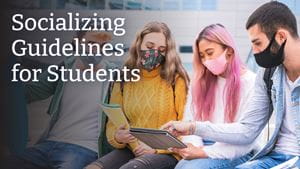
As schools prepare to reopen and safety guidelines continue to adjust to changes in the COVID-19 pandemic, parents are faced with a range of difficult decisions.
One of the hardest decisions is whether or not to allow their children to socialize outside of school. Pediatrician Carolyn Jacobs, MD, and behavioral and mental health specialist Jessica Moore, Ph.D., provide advice to parents as they navigate changing guidelines and recommendations.
For children, interacting with others and partaking in social activity is an integral part of development. When kids hang out with other kids, they learn a variety of social and emotional skills that differ from that in which they gather from their family.
As our community continues to battle the coronavirus pandemic and new COVID-19 variants, should parents allow their kids to socialize outside of school? The answer depends on a variety of factors such as age and vaccination status.
If your child is vaccinated, they may be able to have a closer version to their previous social life than others.
“If they had friends in their social bubble before the pandemic, they can still spend time with those people,” said Dr. Jacobs. “If they’re looking to hang out with new friends or people they haven’t seen in a while, it’s best to do so outside.”
The guidelines are more relaxed if everyone that is socializing together is vaccinated. While it still may be best to gather outside, allowing your vaccinated child to hang out with other vaccinated people is okay.
Whether your child is too young to get the vaccine or they have not yet received it, unvaccinated children should follow more strict socialization guidelines outside of school.
“If you’ve been spending time with another family or child throughout the pandemic, your risk of exposing each other is minimized and you can continue to socialize with them,” said Dr. Jacobs.
However, spending time with new people may not be a good idea.
It’s helpful for parents to gather information about other children. Find out if they have immunocompromised individuals or elderly relatives living in their homes. Stay up-to-date on if they have traveled or been potentially exposed.
“Keeping open communication with other parents and families is crucial during this time. We have to work together to keep everyone safe.”
Whether you allow your children to have friends over your house depends on a variety of factors. Consider the child’s vaccination status and whether your family is vaccinated. If everyone is fully vaccinated, the risk of exposure is low. However, if someone isn’t vaccinated or a family member is at higher risk for serious illness, you may want to avoid having your child’s friends at your home.
Is it appropriate to ask another family if they have received the COVID-19 vaccine? Dr. Moore and Dr. Jacobs say it is, but to be prepared for resistance.
“This is a personal question. You may be met with some awkwardness or defensiveness from some people. Just understand that you cannot force an answer, and you should be understanding of everyone’s circumstances,” said Dr. Moore.
Dr. Jacobs reminds us that others do not have to answer this question. While it’s okay to ask, you may not receive an answer.
Every family has its own set of circumstances that may influence their decisions one way or another. As a parent, there is a lot to consider. Here are a few things to think about:
“The decision isn’t black and white. Making these choices can be tough on parents, especially when many children may not fully understand why there are certain changes,” explains Dr. Moore.
Dr. Moore recommends considering your children’s mental health. For children with great physical health and a low risk of serious illness, allowing more socialization may prove beneficial to their mental and behavioral health.
“Weighing the benefits and risks of physical and mental health can be exhausting for parents. Feel free to reach out to your health care provider and they can help guide you throughout your decision, said Dr. Moore.”
Dr. Moore reminds parents not to underestimate how hard this time may be for children. They are likely experiencing feelings of frustration and confusion, especially during a time of continuous change.
“Be empathetic and understanding with your children. Let them know you understand that this is hard for them and let them know you are here for them if they need to talk.”
Read more on talking to kids about COVID-19
If you decide not to let your child socialize with another child, be sure you do not assign blame. Explain the circumstances in an empathetic way while reminding your child that every family is going through hardships right now. It’s best to remain accepting of everybody’s choices and situations and encourage your child to do the same.